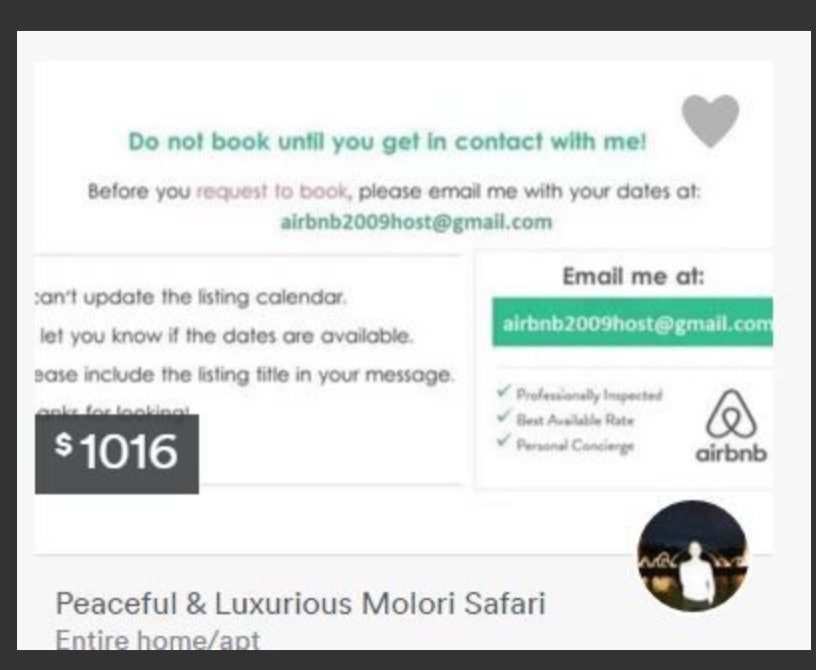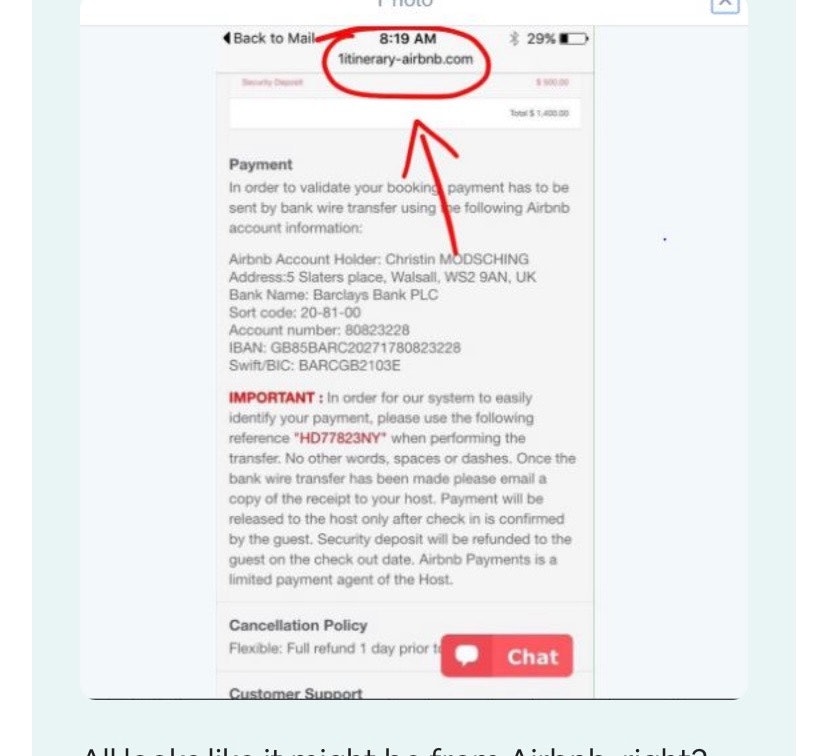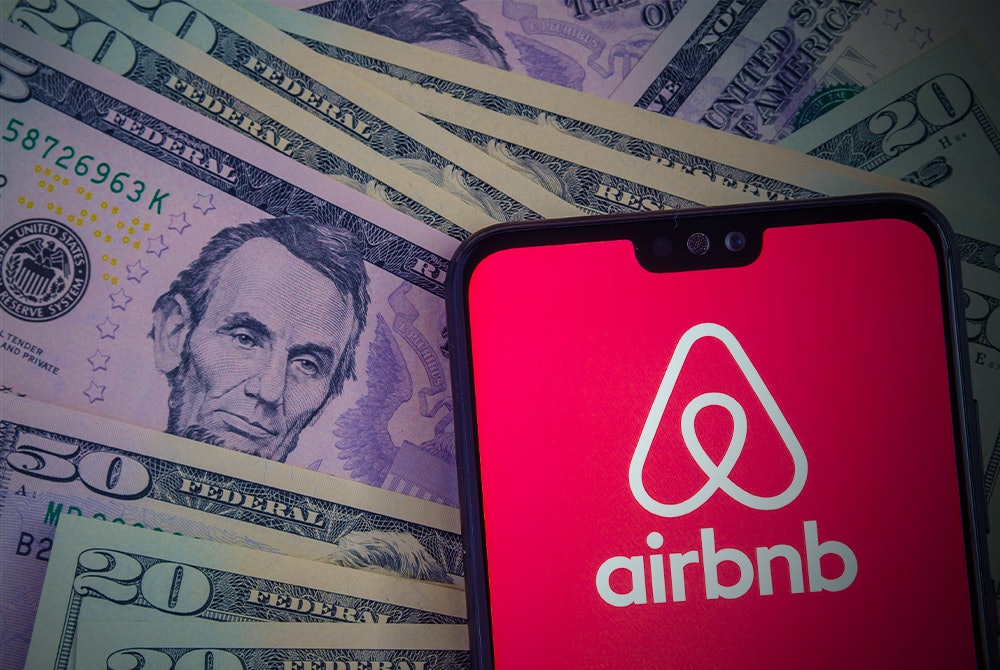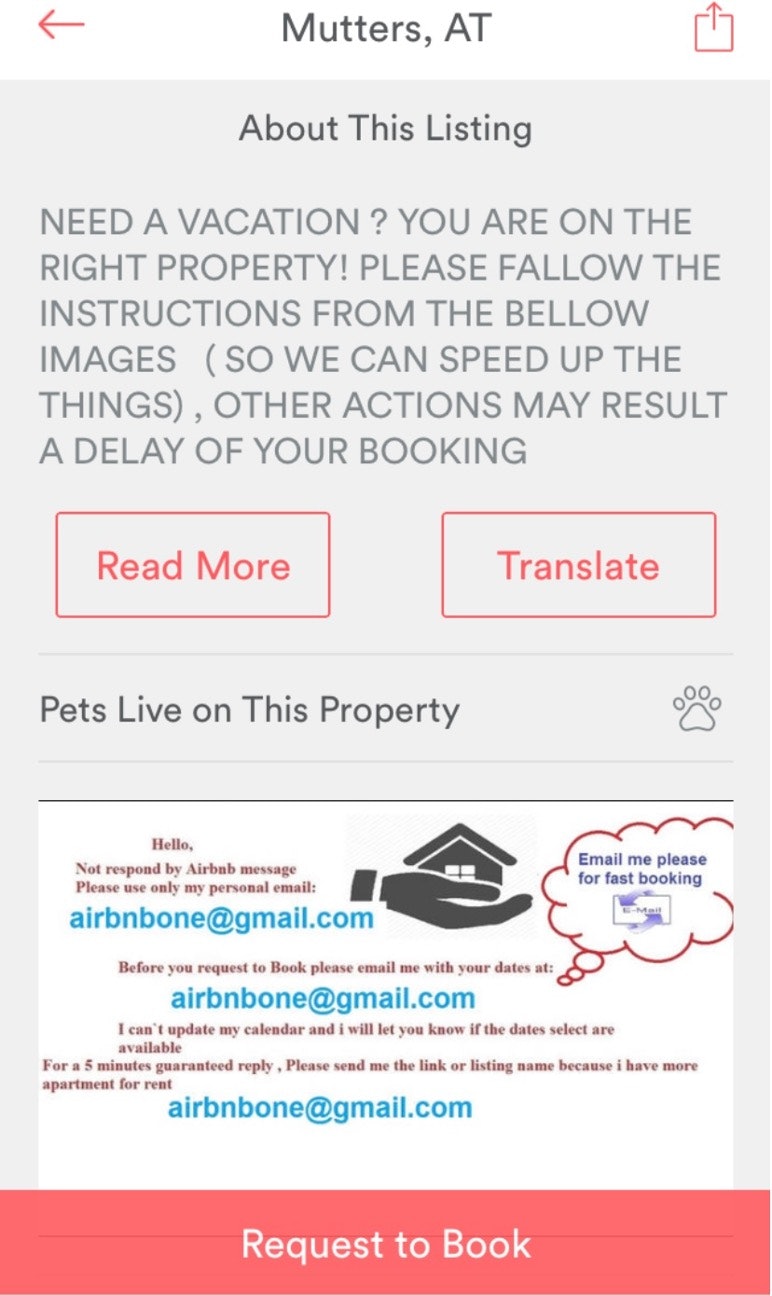- What is an Airbnb Payment Scam?
- How to Beat These Scams
- Red Flags of Airbnb Payment Scams
- What To Do if You’ve Fallen for an Airbnb Payment Scam
- Frequently Asked Questions
With over twelve million listings worldwide, Airbnb is the first choice of many travelers looking for vacation rentals. Unfortunately, scammers have taken notice and prey on unsuspecting users. One of the most popular scams to hit the Airbnb platform is the Airbnb payment scam.
What is an Airbnb Payment Scam?
Airbnb payment scams usually involve someone asking you to pay outside the Airbnb payment platform. They want to use a different payment method because the transaction is somewhat protected if the payment is made within the Airbnb system.
A Host Requests Payment Outside of the Airbnb Website
You find a property you're interested in renting and send a message to the host using the Airbnb website or app.
The host agrees to rent to you but asks you to pay them outside the Airbnb platform. For example, they might ask you to pay them by other payment methods such as:
- Check
- Bitcoin
- Wire transfer
- Another third-party payment app
The host may even entice you with a better rate or a discount if you agree to their terms. Since you're interested in getting a great deal on the property, you agree to pay using their specified payment method (outside the app/website).
Only Pay Using the Airbnb Website
If an Airbnb host requires a payment method outside the website, don't rent from them. This is a huge red flag and a possible sign of a scam.
The Listing Is Fraudulent
Since paying outside the app is against Airbnb rules, chances are, your ideal vacation rental is not as advertised. Some travelers have arrived at their destination only to find out the property is occupied by the owner, who had no idea someone listed their property on Airbnb.
Even if you can stay at the property, you might encounter problems and find out that it falls short of the glowing description on the site. For example, it could be dirty or double-booked.
You'll likely not even realize this was a scam until you've arrived at the destination. You've not only lost your money but you're left stranded, scrambling to find a new place to stay.
You Are Unable to Get a Refund
Since you paid outside the app/website, Airbnb cannot assist you with any problems you have, including getting your money back.
Any money you send to the fraudulent host will be lost, and you will need to make alternate plans for a vacation rental. Your vacation plans might be ruined if you've already arrived and found the property doesn't meet your expectations.
How to Beat These Scams
Once you know what to look for, avoiding Airbnb payment scams is relatively simple. As soon as you notice the shady behavior, it's best to move on and look for a different rental.
Don't Pay for Airbnb Bookings Outside of the Website/App
A payment request via any other method other than through the Airbnb website is a sign of a scam. In addition, don't provide anyone with your payment details in an email, text message, or other forms of communication.
When using Airbnb to book your next vacation rental, always use best practices when paying for and communicating with the host.
Always Pay Through the Platform
No matter how tempting the host's offer is, always make your payments through the Airbnb platform. Sometimes, you'll pay the entire reservation cost when you make your booking request, while other times, they'll split payment so you can pay early for a certain percentage and pay the rest later.
Some hosts will also allow you a grace period to cancel your booking without penalty (or with a small penalty).
The only occasions you might be asked to pay other charges in person would be for resort fees, security deposits, cleaning fees, or local occupancy tax. Hosts must disclose these additional charges in a price breakdown before you book.
Do Not Take Messages Offline
If a host wants to chat with you over email or another third-party app, end the conversation immediately. A legitimate Airbnb host won't have any problems with communicating inside the website or app.
You want to keep everything within your Airbnb account so you have proof of messages and will be more protected in case of a disagreement.
The host in this example asks that users contact her directly via email before booking. She makes it sound as if this is the only way she can check if the dates you're requesting are available. In reality, hosts and users can see date availability through the Airbnb platform.

Double-Check Listings
Legitimate listings should have plenty of photos and reviews and a detailed description of the property and its amenities. If the listing is a recent addition to Airbnb, look for reviews on any other properties the host may manage on Airbnb.
Verify the Property and Host
Check out the property by Googling the address. Then, use Google Street View to see if the pictures match the listing. Check that the images have the "Airbnb.com Verified Photo" watermark, indicating one of the company's professional photographers took the photos. You can also look up the person on social media to make sure it's a real person.
Do a Reverse Image Search
If a listing seems a bit fishy, do a reverse image search on the photos to see if they've been used elsewhere. When scammers want to post fake listings online, they'll usually find images online. With a reverse image search, you find out that that house is listed for rent or sale and is not available for short-term stays.
Red Flags of Airbnb Payment Scams
These Airbnb scams are usually pretty easy to spot. Look for another rental if you notice any of the following red flags.
Requests For Payment Outside of the Airbnb Site
It's a sure sign of fraud when someone asks you to pay outside the Airbnb platform. This typically means you'll be asked to pay with other payment methods, such as cash, check, money order, cryptocurrency, wire transfer, or another third-party payment platform. Of course, the host (i.e., the scammer) doesn't want you to be able to get your money back when you find out you paid for a fraudulent reservation.
A typical vacation rental listing might look normal on the surface. However, you'll likely notice some odd behavior when you dig a little deeper or try to contact the host with questions.
In this example, the scammer has emailed a document to the would-be renter with instructions for wiring payment. The URL at the top, 1itinerary-airbnb.com, is also a fake domain not affiliated with Airbnb. This scammer wants to trick renters into believing they're still on the Airbnb platform.

Offers of a Better Rate
Sometimes, the host offers a better rate if you pay outside of Airbnb. This falls into the "too good to be true" category. Don't fall for the promise of cheaper rates. If you pay outside your Airbnb account, your transaction won't be protected by Airbnb.
Messages Have a Sense of Urgency
If a host wants you to book outside the platform, you might notice the messages have an urgent tone. For example, unless you follow the host's instructions, you won't be able to book the rental, or you might not qualify for the better rate that's offered.
In the below listing, the host claims that booking delays will result unless you contact him via email. The false sense of urgency, spelling mistakes, and strange wording are all dead giveaways of a scam.
Emails With Links or Attachments
If you communicate with a scammer outside of Airbnb, they might send you emails with links or attachments. Those links typically lead to sites not affiliated with Airbnb and take you to a different website to make payment. Not only will your payment be made outside the Airbnb website and therefore not protected, but you may also become the victim of a phishing or malware scam.
What To Do if You’ve Fallen for an Airbnb Payment Scam
As a victim of an Airbnb payment scam, you're dealing with losing your hard-earned vacation funds and may have to shelve your vacation plans altogether. As the Airbnb platform has grown, many people have been in this unfortunate situation.
Report the Scam to Your Bank
This should be the first thing you do after you realize you've been scammed. Your bank may be able to reverse the money transfer or recoup some of your losses, depending on their fraud policies.
If you gave the scammer your credit card or other payment details, you'll want to monitor your bank statements closely and dispute any fraudulent transactions. If the scammer uses your card, your bank can cancel the card and issue you a new one.
Report the Fraudulent Reservation to Airbnb
Airbnb may not be able to recover the funds you paid outside the platform, but the company still wants you to report the fraudulent reservation. You will likely need to forward the contents of your conversations and proof of payment transactions within and outside the Airbnb platform.
Double Down on Cybersecurity Measures
Run an antivirus scan on your device if you clicked on any links from the scammer. Change your passwords for Airbnb, your email, or any other apps you used to communicate with the scammer—they may also have been trying to steal your information.
File a Police Report
Since you may have lost hundreds and even thousands of dollars, file a police report in the town where the scammer's vacation rental is. They may be able to track down the scammer.
Report It to the Authorities
Your best chance of preventing others from becoming a victim is to let the authorities know what happened to you. Report the scam to the authorities, including the Federal Trade Commission (FTC).



Comments